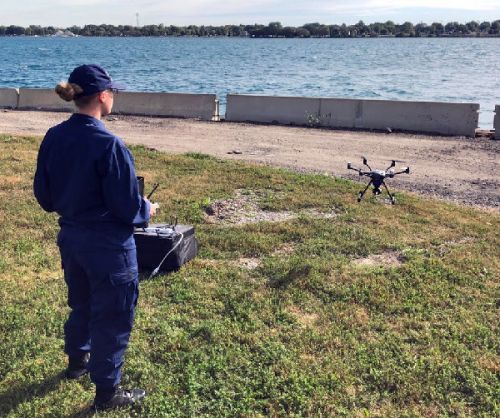Great Lakes Cross-border Oil Spill Training Exercise
OCTOBER 7, 2019 — On September 25-26, OR&R’s LT Michael Doig participated in a multi-day CANUSLAK cross-border oil spill training exercise in Port Huron, Michigan and Corunna, Ontario.
Canada and the United States have a Joint Marine Pollution Contingency Plan (JCP) whose main purpose is to provide a coordinated system for planning, preparedness and response to spills incident occurring in the coastal waters and great lakes regions between the two countries. One of the annexes to this plan, CANUSLAK, covers the Great Lakes.
The first day of the exercise involved the U.S. Coast Guard (USCG) testing booming strategies in the St. Clair River. The exercise involved deploying and recovering multiple 200 foot sections of boom into the river in strong currents. The exercise also incorporated a UAV (Unmanned Aerial Vehicle, or drone) that was able to live-stream video from the event to several remote locations.
Participants included USCG members from Sector Detroit, USCG Atlantic Strike Team, D9 District Response Advisory Team, USCGC Hollyhock, St. Clair Sheriff's Marine Patrol, and T&T Marine.
The second day of the exercise involved concurrent activities on the U.S. and Canadian sides of the St. Clair River. On the U.S. side, the USCG continued testing booming strategies in the Pine River. On the Canadian side, Shell Oil deployed boom and set up an incident command post as part of a simulated oil spill in the St. Clair River. The scenario involved a pinched hose during fueling operations at the Shell Sarnia dock that released 150 tons of ultra-low sulphur diesel into the St. Clair River.
The drill was designed to exercise the Canada and United States Lakes CANUSLAK Plan, part of the Joint Marine Pollution Contingency Plan established to ensure coordinated planning, preparedness, and response to a harmful substance incident in the contiguous waters of the two nations. This exercise presented an opportunity to test and discuss the Wildlife Contingency Plan and the role of the International Coordinating Officer.
Participants in the Shell exercise included the Canadian Coast Guard, U.S. Coast Guard, Environment Canada, Eastern Canada Response Center, Ministry of Environment, NOAA, Transport Canada, and St. Clair Fire among others.
For further information, contact Michael.E.Doig@noaa.gov.
 An official website of the United States government.
An official website of the United States government.


